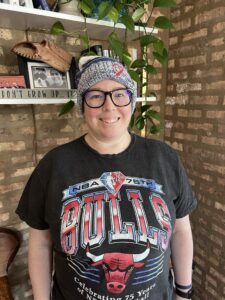My Sarcoma Story – Kate
 Embracing Life After Diagnosis and Advocating for Sarcoma Research and Awareness
Embracing Life After Diagnosis and Advocating for Sarcoma Research and Awareness
Kate DeForge underwent open heart surgery. That is not something most people are thankful for, but for Kate, it led to an unexpected discovery: a cardiac sarcoma diagnosis that may not have been found for a very long time otherwise. At 37 years old, and after recovering from heart surgery, Kate began her journey with sarcoma. One of Kate’s biggest struggles has been managing her sarcoma treatment alongside a mechanical valve she received during heart surgery. A mechanical valve is a type of heart valve made with materials like titanium and carbon. The presence of the mechanical valve complicates her sarcoma treatment and necessitates careful monitoring of her platelet levels. During chemotherapy, there can be a temporary drop in various blood cell counts, including platelets. In Kate’s case, she needs to be on an anticoagulant to help prevent blood clots for the rest of her life. “Once they [platelets] hit 50,000, I have to get off my anticoagulant and go on heparin drips, so it’s led to a lot more in-patient visits on top of my treatment,” says Kate.
Despite these challenges, Kate has been able to maintain a positive attitude and appreciate the little things in life that she once took for granted. Being in a hospital room for long periods for sarcoma treatment has made Kate realize how much she previously overlooked. She now embraces everyday experiences, something that she could not do while in isolation during treatments. She also drew parallels between the isolation she experienced during the nadir phase of cancer treatment to the sense of quarantine experienced during the COVID-19 pandemic. When a patient is in nadir, this means their blood cell count has reached the lowest point during a treatment cycle. “You know, as a cancer patient, when you’re in nadir, you can’t be around anyone, and it feels like you’re in quarantine all over again,” says Kate.
One thing that has been vital throughout Kate’s journey has been her support system. She credits her big family, friends, and wife as the people who have given her unwavering support during her recovery and treatments. “I’ve been lucky that I’ve had tons and tons of support throughout this whole journey, which has been great,” says Kate. Kate also emphasizes the important role her wife played in recovering from her heart surgery. “My wife is my number one caretaker. She drives me to my appointments and cared for me when I was recovering, since I couldn’t use my arms at all, dress myself, bathe, drive, cook, or even take the dog out.”
Kate’s experience with sarcoma has also influenced her perception of the importance of sarcoma research and awareness. “In my case, I have an incredibly rare cardiac sarcoma. What I’m learning is we have no protocol, as it’s not studied enough because there are not enough cases, which is a good thing, but not a good thing for people that actually do have it,” says Kate. She also highlights how her journey has been a learning experience for her and her doctors. Each treatment cycle brings new insights, guiding adjustments, and improvements. Thus, sarcoma research holds great significance for Kate and others with cardiac sarcoma, as it paves the way for enhanced understanding and better treatment outcomes.
Kate’s journey with sarcoma has given her a unique perspective on the importance of increased research and awareness. Harnessing her own experience, she has become a dedicated advocate for fellow sarcoma patients. Notably, she participated in the recent RTCS event in Chicago and has motivated her family to participate in races in different cities, contributing to the cause. “It’s something that once it hits you, and you experience it, you want to jump in and help everyone else because you know what you’re going through, they’re going through too,” says Kate. Kate is determined to take her experience living with sarcoma and channel it into advocacy efforts, raising sarcoma awareness and supporting initiatives that fuel sarcoma research.


